
When most movies claim to be "a day in the life," they don't really mean it. Or, at least, they don't mean what the phrase implies, that what we will see is an average day. There is usually something out of the ordinary, some kind of catalyst for change. In her 1975 film Jeanne Dielman, 23, quai du Commerce, 1080 Bruxelles, Chantal Akerman gets around this problem by depicting three days in the life: the first day normal, the second day harboring the shift, and the third putting a lid on it. It's an amazing study of one widow's crippling boredom and the humiliation of her day-to-day struggle.
It's the routine that is important to Akerman's portrait. Jeanne, played with a weary realism by Delphine Seyrig, has lived alone with her son Sylvain (Jan Decorte), now in his late teens, for the six years since her husband died. Still in the same apartment in Belgium, still sticking to the regular life of a housewife. Rise early, prepare breakfast, polish her son's shoes, send him to school, do the shopping, enjoy lunch and a coffee, prepare dinner in anticipation of Sylvain returning home, etc. It's the same day-in, day-out, and Jeanne approaches each task with a careful certainty. Perhaps the psychology is best revealed in how she sets out the dinner table, carefully retrieving each piece of dishware from the cupboard, placing them where they need to go. She says nothing, experiences neither joy nor pain, she just moves from one step to the next, fully aware that when the meal is done, she will put everything back, reversing the order, the circle complete.

Sounds normal enough, but I left out an important detail. Each afternoon, Jeanne has a different gentleman caller. They disappear into her bedroom together, spend enough time behind the closed doors for the sun to have changed positions, the once bright apartment having gone dark, and then they emerge, the man pays Jeanne for her services, and he silently leaves. Continuing with the ritual, Jeanne puts the money in a pot on the dinner table, which she will dig into the following morning to give Sylvain some cash for the day. Whether the boy has any inkling of how his mother has been earning their way since his father passed is not known. Perhaps he wonders, perhaps he has an idea, there isn't much communication between them, they are stuck in a routine of their own. Depending on his awareness, though, we can read the one frank conversation between them in a variety of ironic ways. He details how he first learned about sex at the age of 10, and how it seemed to him a violent and frightening act, so much so that he hated his father for it and contrived reasons to sleep with his parents so they could not couple. Jeanne tells him that he need not have worried, a loaded statement that itself could have a variety of interpretations. Perhaps in marriage she accepted no less unctuous a fate than she has accepted now. Maybe it was loveless, and her refusal to remarry--she claims she can't see getting used to another person at her age--is not to honor the deceased, but to avoid another boring non-romance.

This heart to heart is a crucial scene precisely because it is the only time either character opens up. Yet, it does little to bridge the distance between them, just as the viewer can't traverse the distance Akerman and writer Danae Maroulacou has put between their subjects and their viewer. We are mere observers here. Any internalization that appears on screen is not shared, all we have is external. We have the action and the unexplained reaction, and then we have our interpretation. Akerman has cinematographer Babette Mangolte always keep her camera somewhere in the middle distance. There are no close-ups, no emphatic zooms, no elaborate tracking shots following Jeanne from one room to the next. The best we can hope for is to be in a position where the camera can turn and watch her walk away and then wait for her to come back. (The apartment practically becomes an added character, hence the importance of the address in the title; also, note that Jeanne lives on "Commerce Street.")
Akerman favors long takes, letting us see each duty unbroken, the details piling on each other. It's not that each tiny action is important unto itself, but it's the cumulative effect. The director marks the end of each day with a title card. Jeanne going to bed is like punching a time clock at a factory, and then we jump to the next day, punch back in. The tedium of her labors, her lonely toil, these things add up. She and her son barely speak, nor does she exchange any words with her johns. When a neighbor drops her baby off so Jeanne can watch the child while she does her shopping, the woman on the other side of the door, whom we never see, talks Jeanne's ear off, but Jeanne barely responds. Yes, it's all rather boring, and it's meant to be so, so why the hell is it so riveting to watch? (And for more than three hours, no less!) I can only attribute it to the constant movement, that Jeanne is never really still. Even when she sits, Delphine Seyrig is still acting. We may not be privy to what thoughts are going through her head, but we can see that the thoughts are there. The actress gives a methodical performance, but it never appears as such. Delphine Seyrig is Jeanne Dielman. Some will say this movie requires patience, but for me, it passed without me noticing the time at all.
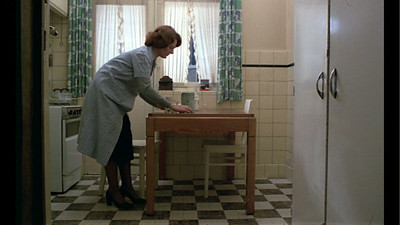
Through this, we come to understand how heavy Jeanne's existence weighs on her, and so it makes sense to us when a small break in the routine sets off a chain reaction the woman can't get out of. When a customer stays too long, Jeanne's potatoes for dinner are overcooked, and she doesn't have enough to make more. So, she has to hurry to the market to buy a new bag and get back in time to peel them and cook them before Sylvain gets home. Otherwise, they can't have the same veal dinner they have every week, each day having its own expected meal. More routine.
This small break from convention is enough, though. The predictability gives Jeanne something more to focus on than what she may be feeling, and when things get unpredictable, the wall crumbles. A simple thing like an empty bag of potatoes suddenly becomes the most important and tragic object in the whole world. It's a heartbreaking scene, Delphine Seyrig sitting alone with a pile of potatoes, fighting back the emotion as she peels them one by one. Jeanne Dielman has come unmoored, and now nothing is going to work as it's supposed to. She can't concentrate on any activity, and she tries to enforce the regular patter with Sylvain even though they are running late. She hasn't even had time to fix her hair, something the clueless son makes mention of. In fact, it's after this that he starts talking about sex as violence. It all keeps Jeanne off balance, and she stays off balance throughout Day 3, as well.
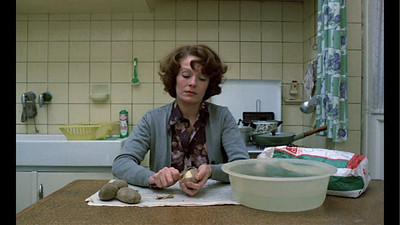
It's amazing to watch the way Akerman and Maroulacou break Jeanne down, and made all the more amazing by how Seyrig executes her performance. Eventually, Jeanne abandons her routine altogether and just sits and stares off into space. She has made two pots of coffee and neither of them taste right to her, she has searched all over the city for a particular button and could not find it, nothing is working. Her denial of her own unhappiness is no longer possible. So, she waits for that afternoon's appointment. Since we've now broken through, Akerman takes us to where we have not been allowed to go before: into the bedroom while Jeanne is working. Up until now, we have been spared witnessing that humiliation, and as a result, I think we've been able to accept it. Like Sylvain, we just don't ask, we only assume Jeanne is fine.

Seeing it now, though, we are witness to how decidedly unerotic the sex is. I guess that towel that we saw Jeanne clean, the one she puts under herself so as not to sully her bedspread, should have been a tip-off, but I don't think anything can quite prepare us for how flaccid even this routine has become. Again, though, we are left with more ambiguity. Stuck under today's hairy beast, who is practically comatose as he goes about his business (at one point I wondered if he had fallen asleep), Jeanne at first looks like she has checked out mentally, but suddenly, she starts to react. She screams and squirms underneath the john. She looks like she is uncomfortable and possibly in pain, but she also looks like maybe she is climaxing. It's another detail that is left up to us. Can she just not take it anymore, and this pig is too lost in his own endeavors to notice? Or has Jeanne's body betrayed her by reacting to his? Either way, something has gone wrong, and this can no longer continue. The sudden action Jeanne takes is shocking, and in so many other movies, would have been a cop-out left-field turn. Yet, all involved with Jeanne Dielman have been so careful in terms of building up to this moment, of chronicling how normalcy turns to chaos, of using the lengthy scenes and the extended running time to push Jeanne from point A to point B to point C, it's a stunningly acceptable move. We get it, we almost applaud it. I'll leave it to others to argue the feminist meaning of Jeanne Dielman; for me, any experience shared with such heartfelt accuracy is more humanist than anything. As one human to another, I empathize.
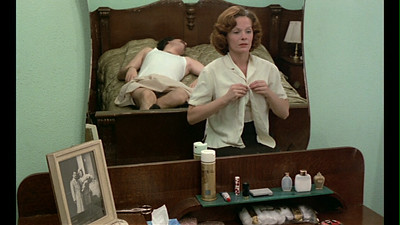
The final scene of Jeanne Dielman, 23, quai du Commerce, 1080 Bruxelles is another long take, this time of Jeanne sitting alone in the dark, contemplating what she has done. It goes on for several minutes, and Seyrig keeps cycling through this movement where her head lulls around in a hypnotic circle. As it goes around, the emotions on her face change. Acceptance, sadness, a hint of pleasure even? We're still outside, still witness to a breakdown, yet now we're in it, too. Once we stepped through that bedroom door, we became complicit, and now, despite how much we don't know, we feel it all. Somehow Chantal Akerman has transported us into Jeanne's chair, and as the credits come up, we find it's impossible to get up and leave. These three days have changed her, these three hours have changed us.
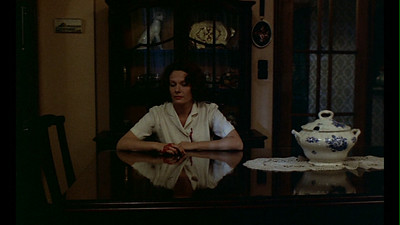
Jeanne Dielman, 23, quai du Commerce, 1080 Bruxelles comes to DVD via the Criterion Collection, and they have worked with Chantal Akerman to create a fantastic looking 1.66:1 image transfer. For a movie with such a limited set, it's fascinating that Akerman has chosen such a wide aspect ratio. She and Babette Mangolte likely did so in order to show us more detail, to let us see a whole room; at first, it feels expansive, but as the movie goes on, as we get to know the apartment more, it starts to feel claustrophobic. The place really is quite small.
Anyway, all of that would be moot if this weren't such a good looking disc. The image is cleaned up nicely, the colors look great, and there is only a hint of haziness in scenes of total darkness, the rest looks exceptional. The image has a little grain, maintaining the look of the original film stock, and I like how that adds to our accepting this as a time capsule of the period in which the film was produced.
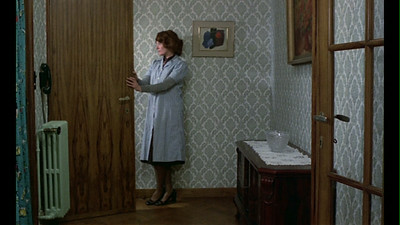
The final extra is Saute ma ville (Blow Up My Village), Chantal Akerman's first film. This short, made in 1968 and starring the director when she was eighteen years old, is an antecedent to Jeanne Dielman in terms of its limited style and being a portrait of one woman; it is also the later movie's polar opposite. As Akerman notes in her video introduction, whereas Jeanne Dielman is about maintaining established routines, Saute ma ville is about tearing everything down. The short subject shows its youthfulness, it has an almost punk-rock energy and, while I wouldn't call it nihilism, there is an adolescent sense of tragedy at work here. The film's sole character is seemingly on some manic high, destroying her apartment in preparation for destroying herself. There is a much silly comedic business (Akerman calls it "Chaplinesque") that adds to the violent shock of the last two scenes. Even then, though, Akerman lets the movie fade out with an incongruous audio snippet of herself singing, followed by recited credits, suggesting perhaps a Godard influence coming to the fore.

For a full rundown on the special features, read the full article at DVD Talk.

3 comments:
I was really blown away by this film. One of my favorite criterion dvd's.
Twice you mention Danae Maroulacou as the film's writer, but IMDb credits only the film's director, Chantal Akerman, as writer.
Furthermore, Maroulacou's credits are almost exclusively as editor; and the two are never credited together on the same film.
Are you suggesting something that is not well known? Or is this an error?
Thanks for the review and your insight.
Bill, I am choosing the trust the credits in the Criterion materials over IMDB. Both the credits in the packaging and on Criterion's site list Danae Maroulacou as the writer. Patricia Canino is credited as editor.
Post a Comment